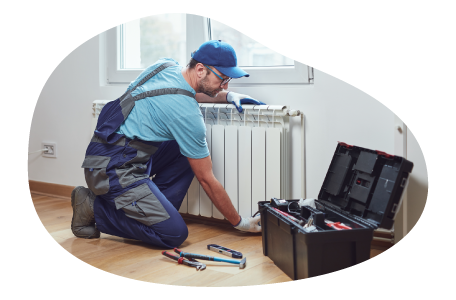
Find insurance for handyman contractors in Utah
Learn about license requirements and the most common handyman insurance coverage options in Utah.

Get the right coverage
Insureon helps handyman contractors compare insurance quotes from top-rated U.S. providers.
Get free expert advice and peace of mind knowing you have the right types of coverage for your unique risks.
What are the most common policies for handymen in Utah?
Handyman contractors may need different types of insurance coverage depending on the work they do. These are the most popular insurance policies for Utah contractors to protect against financial losses.
General liability insurance
A general liability policy covers basic risks, such as accidental damage to a client's sink. Bundle with commercial property insurance for savings in a business owner’s policy (BOP).
- Customer bodily injuries
- Customer property damage
- Advertising injuries
Business owner's policy
A BOP bundles general liability coverage and commercial property insurance at a discount. It's often the most cost-effective type of insurance for handyman businesses.
- Accidents that injure clients
- Client property damage
- Damage to your building or its contents
Workers’ compensation insurance
Utah requires workers’ comp for handyman businesses that have employees. It also protects sole proprietors from job-related medical costs that health insurance might deny.
- Employee medical expenses
- Disability benefits
- Lawsuits from work-related injuries
Commercial auto insurance
A commercial auto policy covers third-party bodily injuries and property damage in accidents involving work vehicles. It can also cover vehicle theft and vandalism.
- Auto accident lawsuits
- Physical damage and collision coverage
- State requirements for auto liability coverage
Contractor’s tools and equipment insurance
This type of contractor insurance helps pay for repair or replacement of a handyperson's hammers, saws, drills, wrenches, and other tools if they are lost, stolen, or damaged.
- Tools less than five years old
- Equipment valued at less than $10,000
- Items brought to jobsites
Professional liability insurance
Professional liability insurance covers legal fees when a handyman is sued for a mistake or oversight. It's also called errors and omissions insurance (E&O).
- Accusations of negligence
- Failure to finish a project on time
- Undelivered services
Surety bonds
A surety bond is an agreement between a handyman contractor, a client, and an insurance company. It guarantees the insurer will reimburse the client if the contractor fails to fulfill their contract.
- Project delays
- Loss of key staff
- Failure to obtain materials
Builder's risk insurance
Builder's risk insurance covers a structure in progress and materials at a construction site. It's sometimes called course of construction insurance.
- Fires
- Storms
- Theft of materials
Contractors pollution liability insurance
Pollution liability insurance can help pay for legal defense costs related to particulates or other pollution that came from your worksite. It's sometimes called environmental insurance.
- Accidental spills
- Cleanup costs
- Pollution lawsuits
Which policies are required for a handyman in Utah?
Whether you're in Salt Lake City, West Valley City, West Jordan, Provo, or elsewhere in Utah, you may need the following types of handyman business insurance to comply with local laws:
General liability insurance
Handyman contractors in Utah who take on projects valued at less than $3,000 can apply for a handyman exemption through the Division of Professional Licensing (DOPL).
While this exemption allows small projects without a contractor license, you may still need to show proof of general liability insurance to homeowners before they'll sign a contract with you.
If you take on projects worth more than $3,000, you’ll need to obtain a contractor license—either as a general or specialty contractor—and carry general liability insurance as part of that licensing requirement.
This coverage protects your business from the financial fallout of common third-party risks like customer bodily injuries and property damage.
Most commercial leases require businesses to carry this coverage. Adding commercial umbrella insurance can boost your coverage on general liability insurance and other types of liability insurance.
Contractor general liability insurance can also help protect against advertising injuries, such as libel, slander, and copyright infringement. For example, it will pay for your legal defense costs if a competitor sues your business for making a false statement about them on social media.
Plumbers, electricians, and other specialty trades in Utah may have additional licensing and insurance requirements.
Workers' compensation insurance
To meet state requirements and get licensed in Utah, handyman businesses that have employees must provide workers’ compensation insurance, which covers medical bills and disability benefits for work injuries.
Some independent contractors and sole proprietors in high-risk professions, such as roofers, tree service technicians, and HVAC contractors, may be required to carry workers' comp in Utah even if they do not have any employees. Most policies include employer's liability insurance, which helps pay for workplace injury lawsuits.
Commercial auto insurance
Commercial auto insurance covers property damage and medical bills resulting from an accident involving your handyman business's vehicle. Depending on the coverage options you choose, it can also pay for vehicle theft, weather damage, and vandalism.
Minimum auto liability requirements for Utah businesses are:
- Bodily injury liability: $25,000 per person / $65,000 per accident
- Property damage liability: $15,000 per accident
- Personal injury protection (PIP): $3,000 per person
For vehicles that are used by the business but are leased, rented, or otherwise not owned by the company, you'll need a separate policy called hired and non-owned auto (HNOA) insurance. This policy provides liability insurance but it does not cover damage to the insured vehicle.
Personal auto insurance will typically not cover any driving for business purposes, which is why you may need supplemental coverage.
Surety bonds
Licensure requirements in Utah sometimes include a surety bond, depending on the type of work you do.
A surety bond guarantees reimbursement for the client if a handyman fails to fulfill the terms of a contract or adhere to regulations. Common types of surety bonds include bid bonds, performance bonds, and payment bonds.

Do I need a license to be a handyman in Utah?
There's no specific handyman license in Utah. However, you may need a contractor's license depending on the type of work you perform and how much you charge.
In general, anyone who takes on construction or repair projects totaling more than $3,000 must hold a contractor license from the Utah Division of Professional Licensing. If you only take on smaller jobs under that amount, you can apply for a handyman exemption, though you may still need to show proof of general liability insurance.
There are several licensing classifications, including:
- General contractor
- Plumber
- Electrician
- HVAC contractor
- Painting contractor
- Drywall contractor
- Masonry contractor
To get licensed, you’ll typically need to meet experience requirements, pass an exam, complete a background check, and pay a licensing fee. The DOPL also requires contractors to carry general liability insurance, workers’ compensation (if you have employees), and a surety bond.
How much you'll pay for the fee depends on whether or not you are the sole owner of the business. Your insurance premiums vary depending on the type of work you do, whether you have employees, and other factors.
How much does handyman insurance cost in Utah?

Utah handyman contractors who buy policies from Insureon pay an average of:
General liability: $76 per month
Workers' compensation: $124 per month
Commercial auto: $159 per month
Several factors affect the cost of handyman insurance, including:
- Handyman services you provide, such as fence repairs or carpentry
- Business property and equipment
- Business income and size
- Years of experience
- Policy limits and deductibles
- Claims history
Verified business insurance reviews
Hear from customers like you who purchased small business insurance.
How do I get Utah handyman insurance?
Insureon helps you save time and money shopping for handyman liability insurance by comparing quotes from top U.S. insurance companies.
Our insurance agents are licensed in Utah and can answer your questions as you consider coverage.
To make the application go quicker, have this information ready:
- Workforce details, such as the number of employees and subcontractors
- Current and projected revenue
- Business partnerships
- Desired coverage limits
- Claims history
- Commercial lease insurance requirements
Apply for free insurance quotes today to find cheap handyman insurance that fits your business needs. Most small business owners receive a certificate of insurance for proof of insurance the same day.
